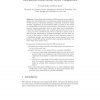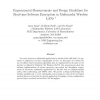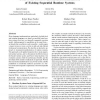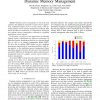264 search results - page 27 / 53 » Minimal-Latency Secure Function Evaluation |
CRYPTO
2000
Springer
14 years 2 months ago
2000
Springer
Secure Function Evaluation (SFE) protocols are very hard to design, and reducibility has been recognized as a highly desirable property of SFE protocols. Informally speaking, reduc...
CLUSTER
1999
IEEE
13 years 9 months ago
1999
IEEE
To secure interactive multimedia applications in wireless LANs WLANs it is pertinent to implement real time cryptographic services. In this paper we evaluate the use of software b...
OOPSLA
2010
Springer
13 years 8 months ago
2010
Springer
Many language implementations, particularly for high-level and scripting languages, are based on carefully honed runtime systems that have an internally sequential execution model...
IPPS
2010
IEEE
13 years 7 months ago
2010
IEEE
Dynamic memory management is one of the most expensive but ubiquitous operations in many C/C++ applications. Additional features such as security checks, while desirable, further w...
IACR
2011
12 years 9 months ago
2011
We put forward a framework for the modular design and analysis of multi-party protocols. Our framework is called “GNUC” (with the recursive meaning “GNUC’s Not UC”), alr...




